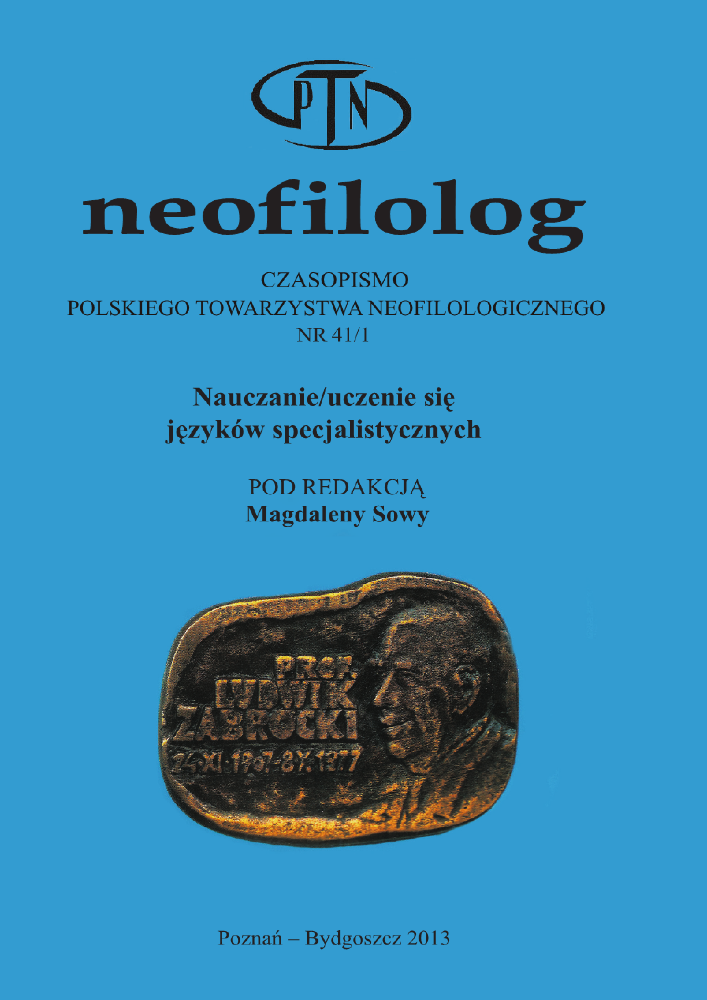Abstract
Verbal communication for specific purposes during language classes invariably involves the decision making process. Decisions primarily concern specialized content and linguistic expressions. The participants in the communication, i.e. teachers and learners, must there-fore have an appropriate level of language competence and expertise. This specialist knowledge, defined as specific knowledge of a professional area and activities related to it, includes both substantial knowledge of the field, knowledge of terminology and discourse structures. Expertise plays an essential role in every aspect of teaching a foreign language for business purposes, as oral communication skills are developed on the basis of specialist knowledge. Broadening spe-cialist knowledge is hence both means and purpose. Deficiencies in specialist knowledge can be seen in the performance of communication tasks when it hinders the ability to reach an agreement. The aim of this article is to analyse the role of expertise in oral communication for specific purposes in business language classes with reference to the author's own research.References
Baumann, Kl.-D. 1992. Integrative Fachtextlinguistik. Tübingen: Gunter Narr Verlag.
Becker-Mrotzek, M. 2009. „Mündliche Kommunikationskompetenz” (w) Mündliche Kommunikation und Ge-sprächsdidaktik (red. M. Becker-Mrotzek). Balt-mannsweiler: Schneider-Verlag Hohengehren: 66-83.
Brünner, G. 1998. „Fachkommunikation im Betrieb am Beispiel der Stadtwerke einer Groβstadt” (w) Fachspra-chen. Languages for Special Purposes (red. L. Hoff-mann, H. Kalverkämper, H.E. Wiegand, Ch. Galinski, W. Hüllen). Halbband 1, (Handbücher zur Sprach- und Kommunikationswissenschaft 14.1). Berlin/New York: Walter de Gruyter: 634-648.
Ćwiklińska, J., Szadyko, S. 2005. „Obszary wiedzy specjalistycznej w wybranych wariantach języka Business Communications”. Języki specjalistyczne 5. Teksty specjalistyczne w kontekstach zawodowych i tłumaczeniach. Katedra Języków Specjalistycznych Uniwersytetu Warszawskiego: 81-88.
Dörnyei, Z., Scott, M. L. 1997. „Review Article. Communication Strategies in a Second Language: Definitions and Taxonomies”. Language Learning 47:1: 173-210.
Grucza, S. 2009. „Fachwissen – Fachsprache – Fachdiskurs: Fachdiskursanalyse aus der Sicht der anthropozent-rischen Sprachentheorie” (w) Diskurse als Mittel und Gegenstände der Germanistik (red. F. Grucza). Ma-terialien der Jahresta-gung und internationalen wissenschaftlichen Konferenz des Verbandes Polnischer Germanisten abgehalten an der Warmia und Mazury Universität 8.-10. Mai 2009, Olsztyn. Warszawa: Wydawnictwo Euro-Edukacja: 15-28.
Hoffmann, L. 1999. „Objekt, System und Funktion in der wissenschaftlich-technischen Fachkommunikation”. Fachsprache 21: 28-37.
Jakobson, R. 1989. „Poetyka w świetle językoznawstwa” (w) W poszukiwaniu istoty języka: wybór pism. Tom 2. Warszawa: Państwowy Instytut Wydawniczy: 77-124.
Kalverkämper, H. 1990. „Gemeinsprache und Fachsprachen – Plädoyer für eine integrierende Sichtweise” (w) Deutsche Gegenwartssprache. Tendenzen und Perspektiven (red. G. Stickel). Jahrbuch 1989 Institut für deutsche Sprache, Mannheim, zum 25jährigen Jubiläum des IdS. Berlin/New York: Walter de Gruyter: 88-133.
Kalverkämper, H. 1998. „Fach und Fachwissen. Fachsprachen” (w) Languages for Special Purposes (red. L. Hoffmann, H. Kalverkämper, H.E. Wiegand, Ch. Galinski, W. Hüllen). Halbband 1, (Handbücher zur Sprach-und Kommunikati-onswissenschaft 14.1), Berlin/New York: Walter de Gruyter: 1-24.
Lenz, F. 1989. Organisationsprinzipien in mündlicher Fachkommunikation, Zur Ge-sprächsorganisation von ,Technical Meetings’. Frankfurt am Main: Peter Lang.
Mamet, P. 2002. „Relacja pomiędzy kompetencją językową a kompetencją merytoryczną na przykładzie języka biznesu”. Języki specjalistyczne 2. Problemy technolingwistyki. Katedra Języków Specjalistycznych Uniwersytetu Warszawskiego: 141-151.
Munsberg, K. 1994. Mündliche Fachkommunikation: das Beispiel Chemie. Tübingen: Gunter Narr Verlag.
Neu, J. 2011. Mündliche Fachtexte der französischen Rechtssprache. Berlin: Frank & Timme.
Roelcke, T. 2010. Fachsprachen. Berlin: Erich Schmidt Verlag.
Schubert, K. 2007. Wissen, Sprache, Medium, Arbeit. Tübingen: Gunter Narr Verlag.
vom Brocke, Ch. A. 2010. eGroups – eine Konzeption zur Vermittlung fachsprachli-cher Handlungskompetenz in evolvierenden Kooperationen. http://miami.uni-muenster.de DW 29.10.2012.
License
Copyright (c) 1970 Neofilolog

This work is licensed under a Creative Commons Attribution-NoDerivatives 4.0 International License.
Authors
Authors of texts accepted for publication in Neofilolog are required to complete, sign and return to the Editorial team’s office the Agreement for granting a royalty-free license to works with a commitment to grant a CC sub-license.
Under the agreement, the authors of the texts published in Neofilolog grant Adam Mickiewicz University in Poznań a non-exclusive, royalty-free license and authorize the use of Attribution-NoDerivatives 4.0 International (CC BY-ND 4.0) Creative Commons sub-license.
The authors retain the right to the free disposal of the work.
Users
Interested Internet users are entitled to use works that have been published in Neofilolog since 2017, under the following conditions:
▪ attribution – obligation to provide, together with the distributed work, information about the authorship, title, source (link to the original work, DOI) and the license itself.
▪ no derivatives – the work must be preserved in its original form. Without the author's consent, it is not possible to distribute the modified work in the form of translations, publications, etc.
Copyrights are reserved for all texts published since 2017.
Miscellaneous
Adam Mickiewicz University in Poznań retains the property right as a whole (layout, graphic form, title, cover design, logo etc.).
